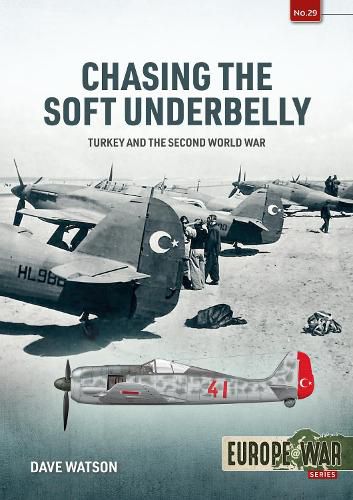Readings Newsletter
Become a Readings Member to make your shopping experience even easier.
Sign in or sign up for free!
You’re not far away from qualifying for FREE standard shipping within Australia
You’ve qualified for FREE standard shipping within Australia
The cart is loading…






Chasing the Soft Underbelly examines the role of Turkey during the Second World War. While it was non-belligerent until February 1945, there were many attempts to push it into the conflict.
Studies of the Second World War traditionally begin with the rise of Hitler and the failure of the Western democracies to challenge fascism. Important though these events were, Turkey and the Balkans played a crucial role at key moments during the conflict. Hitler understood Germany’s need for the natural resources of the Balkans, including Turkish chromite and Romanian oil. As an Austrian, he also remembered the events of 1918 when the Entente knocked Bulgaria and Austro-Hungary out of the war from the Balkans. Turkey was also important to Stalin, who saw the Straits as a route into the Black Sea and the Soviet Union. Churchill was another of the key players in our story whose interest in Turkey went back to the Gallipoli campaign of the First World War. An interest, some might say, an obsession, which he maintained during the interwar years and throughout the Second World War. The ‘soft underbelly’ was his shorthand for attacking Germany through Turkey and the Balkans.
While Turkey is typically a footnote in most histories of the Second World War, it featured highly in the strategies of the combatants. This book explores those strategies based on primary and secondary sources. It starts with a look at Turkey before the war and the threats and opportunities it faced. This includes a chapter on the Turkish armed forces and their preparedness for war. The rest of the book takes the reader chronologically through the war, outlining the various plans of the combatants as they impacted Turkey. These reflected the war’s progress as it raged around Turkey’s borders and, on occasion, within it. It also outlines how the Turkish armed forces developed during the war as they obtained equipment and training from both sides.
Britain was the driving force on the Allied side in the efforts to get Turkey to declare war. While these efforts failed, they did keep Turkey out of the Axis camp, which would have had severe military consequences in 1939-41. The Turkish leadership played a skilful diplomatic and military game to maintain their non-belligerent status, although at a considerable economic cost. Other than in 1942, at the height of the Axis tide, Turkey faced mainly in the direction of the Allies while always worried about the Soviet Union. That concern came to a head as the Red Army arrived on their European border in 1944.
$9.00 standard shipping within Australia
FREE standard shipping within Australia for orders over $100.00
Express & International shipping calculated at checkout
Chasing the Soft Underbelly examines the role of Turkey during the Second World War. While it was non-belligerent until February 1945, there were many attempts to push it into the conflict.
Studies of the Second World War traditionally begin with the rise of Hitler and the failure of the Western democracies to challenge fascism. Important though these events were, Turkey and the Balkans played a crucial role at key moments during the conflict. Hitler understood Germany’s need for the natural resources of the Balkans, including Turkish chromite and Romanian oil. As an Austrian, he also remembered the events of 1918 when the Entente knocked Bulgaria and Austro-Hungary out of the war from the Balkans. Turkey was also important to Stalin, who saw the Straits as a route into the Black Sea and the Soviet Union. Churchill was another of the key players in our story whose interest in Turkey went back to the Gallipoli campaign of the First World War. An interest, some might say, an obsession, which he maintained during the interwar years and throughout the Second World War. The ‘soft underbelly’ was his shorthand for attacking Germany through Turkey and the Balkans.
While Turkey is typically a footnote in most histories of the Second World War, it featured highly in the strategies of the combatants. This book explores those strategies based on primary and secondary sources. It starts with a look at Turkey before the war and the threats and opportunities it faced. This includes a chapter on the Turkish armed forces and their preparedness for war. The rest of the book takes the reader chronologically through the war, outlining the various plans of the combatants as they impacted Turkey. These reflected the war’s progress as it raged around Turkey’s borders and, on occasion, within it. It also outlines how the Turkish armed forces developed during the war as they obtained equipment and training from both sides.
Britain was the driving force on the Allied side in the efforts to get Turkey to declare war. While these efforts failed, they did keep Turkey out of the Axis camp, which would have had severe military consequences in 1939-41. The Turkish leadership played a skilful diplomatic and military game to maintain their non-belligerent status, although at a considerable economic cost. Other than in 1942, at the height of the Axis tide, Turkey faced mainly in the direction of the Allies while always worried about the Soviet Union. That concern came to a head as the Red Army arrived on their European border in 1944.